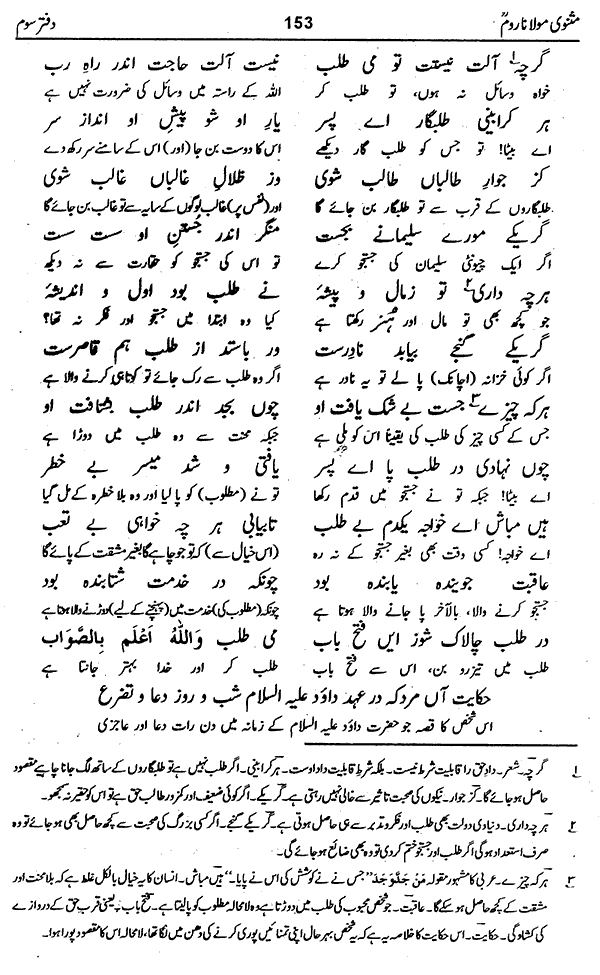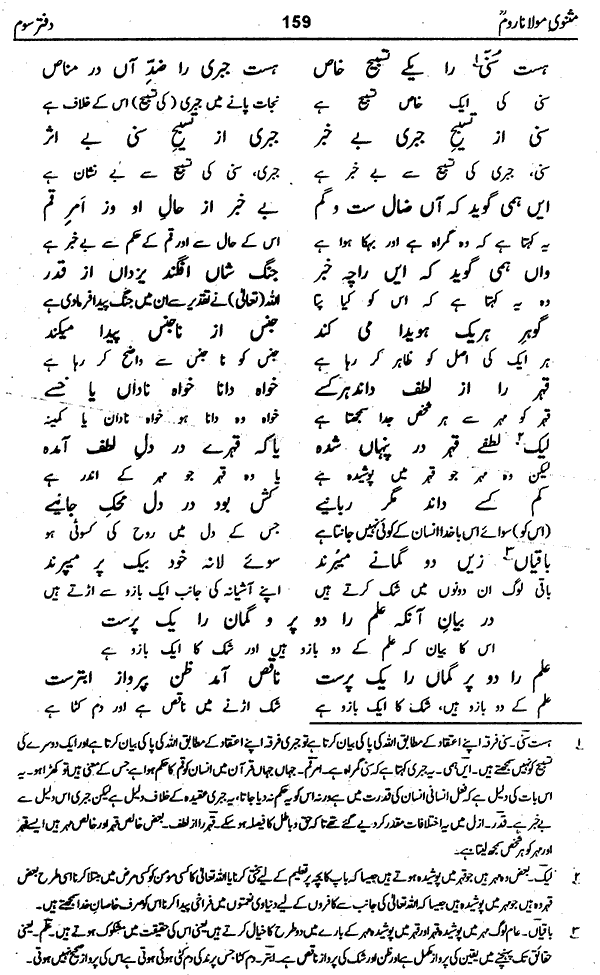Story of the person who in the time of David, on whom be peace, used to pray night and day, crying, “Give me a lawful livelihood without trouble (on my part).”
Used always to utter this prayer: “O God, bestow on me riches without trouble!
Since You have created me a lazybones, a receiver of blows, a slow mover, a sluggard,
One cannot place on sore-backed luckless asses the load carried by horses and mules. Inasmuch as Thou, O perfect One, have created me lazy, do You accordingly give me the daily bread by the way of laziness.
Surely for them that are lazy and sleeping in the shade You have prescribed a livelihood in another fashion.
Every one that has a foot (power to move) seeks a livelihood: do You show some pity towards
every one that has no foot.
Send the daily bread to that sorrowful one: waft the rain-clouds towards every land. Since the land has no foot, Thy munificence drives the clouds doubly towards it.
I crave a daily portion (that is bestowed) suddenly without fatigue (on my part), for I have
naught of endeavour except the seeking.”
Thus was he praying for a long time, (all) day until night and all night until morning. The people were laughing at his words, at the folly of his hope, and at his contention,
Saying, “Marvellous! What is he saying—this idiot? Or has some one given him beng (that is the cause) of senselessness?
‘Seek ye your daily portions in the means thereof: enter your dwellings by their doors.’
At present the King and ruler and messenger of God is the prophet David, one endowed with many accomplishments.
Notwithstanding such glory and pride as is in him, forasmuch as the favours of the Friend have
chosen him out—
His miracles are countless and innumerable, the waves of his bounty are tide upon tide:
At that time the lion and the deer unite (in turning) towards his exhortation, the one oblivious of the other;
The mountains and the birds are accompanying his breath (voice), both are his confidants in the hour of his calling (únto God);
These and a hundred times as many miracles are (vouchsafed) to him; the light of his countenance is (both) transcendent and immanent—
Without weaving coats of mail and (without) some trouble (on his part), his livelihood is not coming (to him), notwithstanding all his victoriousness.
(Yet) a God-forsaken abandoned one like this, a low scoundrel and outcast from Heaven,
A backslider of this sort, desires, without trading, at once to fill his skirt (pocket) with gain! Such a crazy fellow has come forward, saying, ‘I will climb up to the sky without a ladder.’”
And that one would laugh, (saying), “Give us too (a share) of what you get as a gift, O headman of the village.”
(But) he was not diminishing his prayers and wheedling entreaties because of this abuse and
ridicule from the people,
So that he became well-known and celebrated in the town as one who seeks (to obtain) cheese from an empty wallet.
That beggar became a proverb for foolishness, (but) he would not desist from this petitioning.
How a cow ran into the house of him that was praying importunately. The Prophet, may God bless him and grant him peace, has said, “God loves them that are importunate in prayer,” because the actual asking (of anything) from God most High and the importunity (itself) is better for the petitioner than the thing which he is asking of Him.
Suddenly a cow ran into his house; she butted with her horns and broke the bolt and key.
The cow boldly jumped into the house; the man sprang forward and bound her legs.
Then he at once cut the throat of the cow without pause, without consideration, and without mercy.
After he had cut off her head, he went to the butcher, in order that he might quickly rip off her
hide forthwith.
The Poet's excusing himself and asking help.
The fulfilment of this (task), show the way, give aidance, or (else) relinquish the demand and do not lay (the burden) upon me!
Since You art demanding gold from an insolvent, give him gold in secret, O rich King! Without Thee, how should poesy and rhyme dare to come into sight at eve or morn?
Poesy and homonymy and rhymes, O Knowing One, are the slaves of Thy Command from fear and dread,
Each glorifies (Thee) in a different fashion, and that one is unaware of the state of this one. Man disbelieves in the glorification uttered by inanimate things, but those inanimate things are
masters in (performing) worship.
Nay, the two-and-seventy sects, every one, are unaware of (the real state of) each other and in a (great) doubt.
Since two speakers have no knowledge of each other's state, how will (it) be (with) wall and door?
The Sunní is unaware of the Jabrí's (mode of) glorification; the Jabrí is unaffected by the Sunní's
(mode of) glorification.
The Sunní has a particular (mode of) glorification; the Jabrí has the opposite thereof in (taking)
refuge (with God).
This one (the Jabrí) says, “He (the Sunní) is astray and lost,” (being) unaware of his (real) state and of the (Divine) command, “Arise (and preach)!”
And that one (the Sunní) says, “What awareness has this one (the Jabrí)?” God, by fore-
ordainment, has cast them into strife.
Every one knows (can distinguish) mercy from vengeance, whether he be wise or ignorant or vile,
But a mercy that has become hidden in vengeance, or a vengeance that has sunk into the heart
of mercy,
No one knows except the divine (deified) man in whose heart is a spiritual touchstone.
The rest hold (only) an opinion of these two (qualities): they fly to their nest with a single wing.










No comments:
Post a Comment